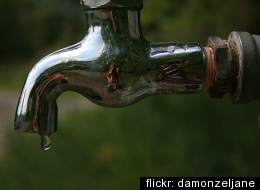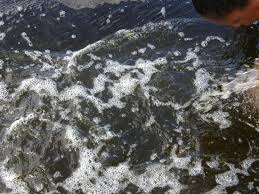 A coalition of communities in six Midwestern states filed a federal lawsuit Monday seeking to force the manufacturer of a widely-used herbicide to pay for its removal from drinking water.
A coalition of communities in six Midwestern states filed a federal lawsuit Monday seeking to force the manufacturer of a widely-used herbicide to pay for its removal from drinking water.
Atrazine, a weed-killer sprayed primarily on cornfields, can run off into rivers and streams that supply municipal water systems. As the Huffington Post Investigative Fund reported in a series of articles last fall, the U.S. Environmental Protection Agency failed to notify the public that atrazine had been found at levels above the federal safety limit in drinking water in at least four states.
The lawsuit was filed in U.S. District Court for the Southern District of Illinois by 16 cities in Kansas, Illinois, Indiana, Ohio, Missouri, and Iowa. The communities allege that Swiss corporation Syngenta AG and its Delaware counterpart Syngenta Crop Protection, Inc. reaped billions of dollars from the sale of atrazine while local taxpayers were left with the financial burden of filtering the chemical from drinking water.
16 Cities Sue Manufacturer Of Atrazine Weed-Killer For Contaminating Drinking Water
Mystery problem again hits bee colonies
 A mysterious problem that causes bee colonies to decline is once again taking its toll on the state's beekeepers. The problem known as colony collapse disorder is characterized by a sudden drop in a bee colony's population and the inexplicable absence of dead bees.
A mysterious problem that causes bee colonies to decline is once again taking its toll on the state's beekeepers. The problem known as colony collapse disorder is characterized by a sudden drop in a bee colony's population and the inexplicable absence of dead bees.
The disorder has no known cure and appears to be cyclical. After several mild years, it has resurfaced with a vengeance, said Eric Mussen, apiculturist with the University of California at Davis. "It never went away, but this year a substantial number of beekeepers got walloped again," said Mussen, the state's leading bee expert. "And worse than they had been hit before."
Although Mussen said it is too early to tell exactly how many bees have been lost, a bee industry official said losses in the state vary from 30% to 80%.
Growing low-oxygen zones in oceans worry scientists
 Lower levels of oxygen in the Earth's oceans, particularly off the United States' Pacific Northwest coast, could be another sign of fundamental changes linked to global climate change, scientists say. They warn that the oceans' complex undersea ecosystems and fragile food chains could be disrupted.
Lower levels of oxygen in the Earth's oceans, particularly off the United States' Pacific Northwest coast, could be another sign of fundamental changes linked to global climate change, scientists say. They warn that the oceans' complex undersea ecosystems and fragile food chains could be disrupted.
In some spots off Washington state and Oregon, the almost complete absence of oxygen has left piles of Dungeness crab carcasses littering the ocean floor, killed off 25-year-old sea stars, crippled colonies of sea anemones and produced mats of potentially noxious bacteria that thrive in such conditions.
Humans must be to blame for climate change, say scientists
 Climate scientists have delivered a powerful riposte to their sceptical critics with a study that strengthens the case for saying global warming
Climate scientists have delivered a powerful riposte to their sceptical critics with a study that strengthens the case for saying global warming
is largely the result of man-made emissions of greenhouse gases.
The researchers found that no other possible natural phenomenon, such as volcanic eruptions or variations in the activity of the Sun, could explain the significant warming of the planet over the past half century as recorded on every continent including Antarctica.
Methane bubbles in Arctic seas stir warming fears
 Large amounts of a powerful greenhouse gas are bubbling up from a long-frozen seabed north of Siberia, raising fears of far bigger leaks that could stoke global warming, scientists said.
Large amounts of a powerful greenhouse gas are bubbling up from a long-frozen seabed north of Siberia, raising fears of far bigger leaks that could stoke global warming, scientists said.It was unclear, however, if the Arctic emissions of methane gas were new or had been going on unnoticed for centuries -- since before the Industrial Revolution of the 18th century led to wide use of fossil fuels that are blamed for climate change.
The study said about 8 million tonnes of methane a year, equivalent to the annual total previously estimated from all of the world's oceans, were seeping from vast stores long trapped under permafrost below the seabed north of Russia.
More...
U.S. backs efforts to ban international trade of Atlantic bluefin tuna
 The U.S. government announced Wednesday that it supports prohibiting international trade of Atlantic bluefin tuna, a move that could lead to the most sweeping trade restrictions ever imposed on the highly prized fish.
The U.S. government announced Wednesday that it supports prohibiting international trade of Atlantic bluefin tuna, a move that could lead to the most sweeping trade restrictions ever imposed on the highly prized fish.
Sushi aficionados in Japan and elsewhere have consumed bluefin for decades, causing the fish's population to plummet. In less than two weeks, representatives from 175 countries will convene in Doha, Qatar, to determine whether to restrict the trade of bluefin tuna -- valued for its rich, buttery taste -- and an array of other imperiled species under the Convention on International Trade in Endangered Species (CITES).
Herbicide Chemical in Drinking Water Could Pose Much Greater Danger to Health Than Previously Thought
 Contamination of drinking water by a common herbicide poses a greater health threat than previously believed, according to a report issued by the nonprofit environmental organization Natural Resources Defense Council (NRDC).
Contamination of drinking water by a common herbicide poses a greater health threat than previously believed, according to a report issued by the nonprofit environmental organization Natural Resources Defense Council (NRDC).
More Articles...
Page 171 of 202

 Environmental Glance
Environmental Glance






























